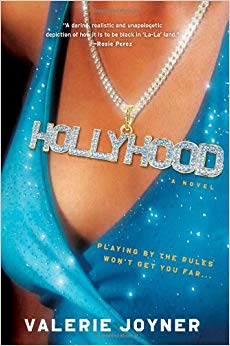 1) Please summarize the plot of your debut novel, Hollyhood.
1) Please summarize the plot of your debut novel, Hollyhood.
Hollyhood follows the life of Tyrone Hart, a young black television producer. His hit show comes under scrutiny when the ratings drop and the studio execs want to change the format of his show to appeal to the white audience.
2) What inspired this story – and the cool title? When did you work out on the Left Coast, and what was your personal experience in Tinseltown?
Years ago I read “Number 1 with a Bullet by Elaine Jasper. It was a behind-the-scene story about the music industry. After reading it, I was inspired to write about the world of television, which I was working in at the time. I worked on several black sitcoms in the nineties such as In Living Color, The Wayans Bros and The Jamie Foxx Show and I’d had a wonderful experience working in Tinseltown. I feel kinda lucky that was able to work on those shows. In Living Color opened a lot of doors. After it’s success came Martin, and other black shows followed.
3) How much of this fictional narrative is truth? Is each character based on a real-life Hollywood player that you met in L.A.?
The weekly cycle of how a show is produced is all truth. From the Monday morning table-read, to the taping on Friday night. I wanted readers to get a real sense of how a show is produced and the roles of the producers, cast and crew.
4) There are some outrageous moments in Hollyhood, with all the drug-induced, sexually-charged debauchery we’d expect from the newly-rich (and aspirational poor) in La La Land. What’s the most outrageous moment you personally experienced in Hollywood? Did you have to embellish these scenes to make the novel pop, or do you think the book accurately reflects the real-life drama of cocky moviemakers and their often insecure stars?
My most outrageous moment I personally experienced is reflected in the book when Venus drinks an hallucinagenic.
I think Hollyhood accurately reflects the real life drama of television in many ways. Did I embellish? Absolutely. I am creative writer.
5) What was the writing process like for you? How long did it take to finish the book, when and where did you write Hollyhood, and did you have as much fun writing the book as I had reading it?
The writing process was fun and hard work at the same time. It was fun to look back on my experiences in television. I found myself calling friends in LA and reminiscing. It took about a year to complete the first draft and another year to complete a second draft. I wrote most the first draft in a local coffee shop in Brooklyn called Tillies. I’d go there each day write from about 9:30 until 4:00pm when I was not working. When I was working a 9 to 5 gig, I went there in the evenings and weekends.
6) How did the book publishing industry respond to your manuscript? Describe the process of securing an agent and an editor interested in your work.
I secured all THREE of my agents with a query letter. People think agents don’t read queries but they do. Things didn’t work out with each agent, which is why I had three. But once the book was sent out to editors, it was turned down many times. The publsihing world seems more interested in street lit and celebrity books, rather than popular fiction and literay from African-American writers. And while my title lends itself to street lit, the content is not. I think editors were thrown by the title. And honestly, I thought Hollyhood would be an easy sell, but nothing was further from the truth. Finally, we got a yes from Esi Sogah at Avon Books.
7) Your book is about Black Hollywood, but now you are submerged in the world of Black Books. Where does Hollyhood fit in the current book market? Is it chick lit, literary, street lit, or popular fiction?
While the title sounds like street lit…….Hollyhood is indeed popular fiction.
8) There has been much debate lately about the real estate in mainstream book stores. Some readers, writers, editors, and sales persons want to do away with the African American section in places like Borders and Barnes & Noble, while others think those shelves are essential to Black book sales. Where do you stand in this debate?
As a result of the Internet, I don’t browse bookstores as much as I used to. But when I did, I found the African-American section to be helpful in finding books by African-American authors.
9) It’s hard to imagine New York writers and editors engaging in the kinds of (ahem) extra-curricular activities that pop off in Hollyhood, but there must be some similarities between the two worlds. After all, half the folk working in the L.A. film industry are from the East Coast. In what ways are the worlds of Black Hollywood and Black New York alike? What’s the biggest difference between the two?
I’m not immersed in the New York writers circle. So, I can’t say.
10) What’s next for you? What project are you working on now? Will there be a sequel to Hollyhood?
I am not working on anything at the present time. If there is an interest in a sequel, I have the outline prepared. I have plenty more Hollywood experiences to draw upon.